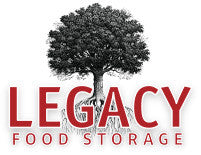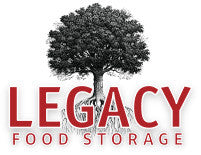Every Day Calories as a Part of Emergency Food Storage
 You may or may not have thought about his, but it’s important to consider how many calories are in the products you keep in your emergency food storage.The side of many packaged foods will identify calorie intake against a diet of 2,000 calories per day. While that’s a nice median number, it shouldn’t necessarily be the gauge for everyone since we all have different bodies and pursue different levels of activity. That’s why it’s important to determine the true number of calories you should be consuming every day depending on your body type and how active you are. In fact, it’s a good idea to do some calorie calculations for every person you’ll be storing food for.Age, Weight, Height and ActivityIn order to correctly determine how many calories our bodies really need it’s important to be honest with ourselves. Nobody likes to admit they don’t exercise as much as they should, or that their metabolism isn’t what it used to be—and I don’t know if anyone really likes aging after a certain birthday.There are a few different ways to help identify the correct caloric intake for your body type and the level of activity you engage in. First of all, there are very simple calorie calculators like the one offered through the Mayo Clinic where you simply enter your weight, height, age, and select your activity level. Again, honesty really matters, and to get the correct number I had to confess that my active lifestyle isn’t as active as it used to be.If you want to actually see the math behind this kind of calculation you can also perform a simple equation to find your Basal Metabolic Rate (BMR), or the amount of calories that would be required if a person was completely sedentary and didn’t ever leave the couch at all. For men, BMR=66 + ( 6.23 x weight in pounds ) + ( 12.7 x height in inches ) – ( 6.76 x age in years )For Women, BMR=655 + ( 4.35 x weight in pounds ) + ( 4.7 x height in inches ) – ( 4.7 x age in years )Since most of us at least get up and move around a little bit on an average day, finish the calculation by determining your level of activity from the chart below and using the included multiplier to find the daily number of calories you need.
You may or may not have thought about his, but it’s important to consider how many calories are in the products you keep in your emergency food storage.The side of many packaged foods will identify calorie intake against a diet of 2,000 calories per day. While that’s a nice median number, it shouldn’t necessarily be the gauge for everyone since we all have different bodies and pursue different levels of activity. That’s why it’s important to determine the true number of calories you should be consuming every day depending on your body type and how active you are. In fact, it’s a good idea to do some calorie calculations for every person you’ll be storing food for.Age, Weight, Height and ActivityIn order to correctly determine how many calories our bodies really need it’s important to be honest with ourselves. Nobody likes to admit they don’t exercise as much as they should, or that their metabolism isn’t what it used to be—and I don’t know if anyone really likes aging after a certain birthday.There are a few different ways to help identify the correct caloric intake for your body type and the level of activity you engage in. First of all, there are very simple calorie calculators like the one offered through the Mayo Clinic where you simply enter your weight, height, age, and select your activity level. Again, honesty really matters, and to get the correct number I had to confess that my active lifestyle isn’t as active as it used to be.If you want to actually see the math behind this kind of calculation you can also perform a simple equation to find your Basal Metabolic Rate (BMR), or the amount of calories that would be required if a person was completely sedentary and didn’t ever leave the couch at all. For men, BMR=66 + ( 6.23 x weight in pounds ) + ( 12.7 x height in inches ) – ( 6.76 x age in years )For Women, BMR=655 + ( 4.35 x weight in pounds ) + ( 4.7 x height in inches ) – ( 4.7 x age in years )Since most of us at least get up and move around a little bit on an average day, finish the calculation by determining your level of activity from the chart below and using the included multiplier to find the daily number of calories you need.
| Little/No Exercise | Daily Calories Needed=BMR X 1.2 |
| Light Exercise (1-3 days/week) | Daily Calories Needed=BMR X 1.375 |
| Moderate Exercise (3-5 days/week) | Daily Calories Needed=BMR X 1.55 |
| Heavy Exercise (6-7 days per week) | Daily Calories Needed=BMR X 1.725 |
| Intense Exercise (2X/day) | Daily Calories Needed=BMR X 1.9 |
It’s important to know and understand how many calories our bodies require ever day in order to perform routine activities, improve our health (or stay healthy), maintain a certain weight, or even loose weight. It’s also important to consider your caloric intake and other nutritional benefits while building your emergency food storage. Wise Food Insuranceunderstands the benefits and values the importance of nutrition. That’s why our site displays the labels of all the emergency food products we sell, so that you can identify the appropriate amount of servings based on the needs of your family. After all, there’s no reason proper nutrition shouldn’t be a part of preparation.
—Jared Matkin—Jared Matkin is a Salt Lake City based freelance writer and outdoor enthusiast who is continually on the lookout for innovative and usable products designed to help improve the way we live.

The post Every Day Calories as a Part of Emergency Food Storage appeared first on Buy Emergency Food.
Tags
- All
- 25 year food
- 25 year shelf life food
- 72 hour kit
- Best food storage types
- Best long-term food storage
- Blizzard preparedness
- Budgeting
- canning
- Certified GMO-free Emergency foods
- Certified GMO-free foods
- Coffee
- Comparison of emergency food methods
- Composting tips
- Dangers of genetically modified foods
- dehydrated food
- Edible Wild Plants
- emergcy preparedness
- Emergency Cooking
- Emergency Food
- Emergency food Christmas gifts
- emergency food storage
- Emergency Food Supply
- Emergency food supply recommendations
- Emergency Planning
- Emergency Preparedness
- Emergency preparedness advice
- emergency preparednesss
- Emergency Supplies
- Emergency supplies checklist
- Emergency Survival
- emergency survival gear
- Emergency survival kit checklist
- Emergency Survival skills
- exercise
- Family emergency preparedness
- Family emergency preparedness plan
- Family Preparedness
- Food Storage
- Food storage 25 year shelf life
- Food storage amounts
- Food storage Christmas
- Food storage containers long term
- Food Storage Secrets
- Food storage serving size
- Food storage types compared
- freeze dried food
- Freeze dried food storage
- freeze dried meats
- Freeze-dried emergency food storage
- Fruit Trees
- Gardening
- Getting Started
- Gluten-free food Storage
- Gourmet emergency food
- Healthy food storage
- How much emergency food to store
- Improved emergency preparedness
- Jared Markin
- Jared Matkin
- Legacy Premium
- Lessons learned from Hurricane Sandy
- Lessons learned from natural disasters
- long-term food storage
- Long-term Food Storage Guidelines
- Long-term Food Storage tips
- Long-term water storage
- Mental Emergency Preparedness
- Mental toughness
- Money-saving tips
- Natural disaster planning
- Natural Disasters
- Perfect Christmas gifts
- Pet Emergency preparedness checklist
- Pet Emergency preparedness kit
- Pet Emergency Survival tips
- Pets and Emergency Preparedness
- Plant Foraging
- portable solar panels
- portable solar power
- portable water filters
- protein drinks
- Risk of genetic modification
- Seed saving and storage
- Seed saving guide
- Self-reliance
- Self-reliant practices
- Shelf Life
- Solar Cooking
- Solar Ovens
- Special Dietary needs
- Stranded in a car in a blizzard
- Survival food
- Survival Gear
- survival kit
- Survival kits
- Survival Ovens
- Survival Skills
- survivalist gear
- suvival kit
- Tree Pruning tips
- Tree Trimming basics
- unique ideas
- water bottle with filter
- water filter
- water filter straw
- water filters
- Water Filtration
- water pitcher with filter
- water pitchers with filters
- Water purification
- Wild Food Foraging
- Winter composting
- Winter driving
- Winter preparedness tips
- Winter storm preparedness tips
- Winter Survival







